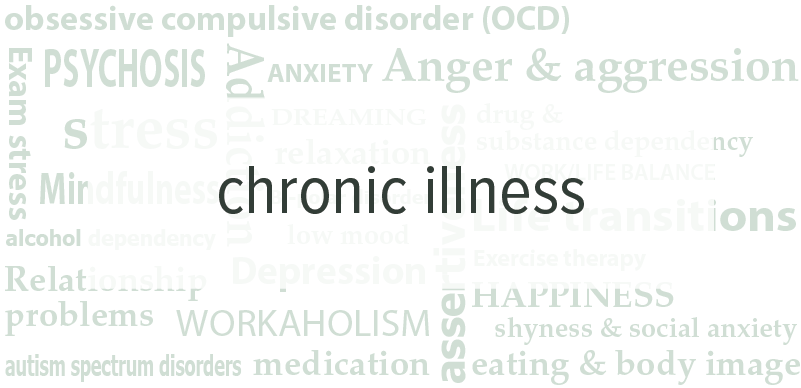Chronic illness
Many of us will experience some sort of physical illness at some point in our lives. Everyone will respond to this differently and depending on the kind of illness and potential ongoing treatments, illness can sometimes have a significant impact on our mental health. It can be difficult to adapt to a new reality and a new diagnosis of cancer, chronic pain, or any other long-term illness can be difficult to process.There are many different symptoms that can arise when adjusting to life with chronic illness. These include:
- Feeling sad
- Feeling a loss of control
- Feeling hopeless
- Loss of pleasure in previously enjoyable activities such as hobbies or sex
- Lack of energy
- Difficulty concentrating and making decisions
- Suicidal thoughts
Socialising
Try to focus on the relationships that are most important to you. Let go of any relationships that may be adding more stress to your life. Sharing fears and concerns with people you trust can be a relief for many people struggling with the burden of an illness.Understanding
When you are living with a long-term condition, it can be useful to ask as many questions as you can, so you can begin to understand your illness in more depth. Don’t be afraid to dig for as much information as possible and make use of any credible resources available to you.Relaxation
Chronic illness can contribute to higher levels of stress and anxiety around everyday activities, so it is important to give your mind and body time to relax. Activities such as exercise, mindfulness, and reading are just some ways in which people can incorporate self-care into their daily routines.Lifestyle
It can be common for people struggling with chronic illness to lose their appetite or fall into unhealthy lifestyle patterns, due to elevated levels of stress and anxiety. By trying to maintain a healthy diet, getting enough sleep and doing exercise, a healthier level of well-being can be achieved.Family and Carers
Supporting a family member or caring for anyone with chronic illness can sometimes be mentally and physically exhausting. Some of the things that will be required of a carer would include emotional support, giving medicine, cooking and cleaning, or even looking after finances. Supporting another person in this way over a long period of time can be both mentally and physically challenging, so is important for carers to also take time for themselves. Remember, it isn’t possible to fully support someone else if you are not supporting yourself. Things can be especially challenging if the person you are caring for decides they do not need support from you.Ways to take care of yourself when caring for someone with a chronic illness:
Talk about how you feel
It is important to talk to someone you can trust about your feelings if you are ever struggling in your caring role. Don’t ever be afraid to ask for help if you need it. Be it through a support group or asking someone directly, they may be able to help lighten the load.Take time to relax
Caring is an important role but can also be a tiring one. Relaxation techniques can help you feel more rested so taking up an activity such as meditation, yoga, or even just reading a chapter of your favourite book, can provide you with that essential ‘me-time’.Don’t take on too much
As a carer, it is important to be realistic about what you can do. Try keeping a schedule of important information and tasks related to the person you’re supporting but accept there may be parts that you cannot change, or take care of by yourself, and that’s ok.Look after yourself
When focusing so closely on looking after another, it can be easy to stop looking after yourself as much as you should be. By looking after your physical health, eating well, getting plenty of sleep, you will find yourself in a better state of well-being and therefore able to provide more quality support as a carer.Feel free to contact us to ask about psychological therapies available at First Psychology that may help support you or someone you know who is struggling with chronic illness.
Further information about coping with chronic illness
Useful websites- https://www.nimh.nih.gov/health/publications/chronic-illness-mental-health/index.shtml
- https://patient.info/health/depression-leaflet/features/how-a-chronic-illness-affects-your-mental-health
- https://www.mind.org.uk/information-support/helping-someone-else/carers-friends-family-coping-support/your-mental-health/#.Wwa7yEgvyUk
Practitioners who work with Chronic illness in Dundee:
Thom Irelan, Consultant Counselling Psychologist (Online only)











